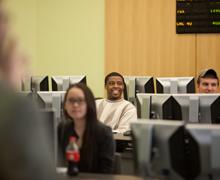By KAREN GRAVA
Director of Media Relations
As part of an exercise in Dennis Blader’s First-Year Experience (FYE) class, the students were asked to introduce a classmate and share something about the individual. There was one catch: they weren’t allowed to share information verbally – except for the spelling of their partner’s name – and could report information about their partner only from Internet sources.

Some were unable to muster up the most basic information. And those who could identify another student’s interests couldn’t determine whether the information was accurate, complete or even true.
“A couple of students could not access any information about their partner because the person did not have a Facebook page or allowed only very limited access to its contents,” said Blader. “For all intents and purposes, by using Facebook as their sole source of information, the person’s existence could not be determined or corroborated as being truthful.”
And that was exactly the point. Blader, a practitioner-in-residence in the Department of Communication, Film, and Media Studies, is teaching a new FYE course on cyber communications issues, and he wants students to look well beyond Facebook, where the information is provided by the individual who holds the online account.
Blader also wants the students to learn how to determine what information on the Web is trustworthy, recognize unethical behavior, use proper cyber-etiquette and cyber-safety measures, and learn how to protect themselves against identity theft and other security concerns.
What happens when you view a website and cyber-stalkers record that information for, among other uses, marketing purposes? “Every click you make provides insight into your habits, preferences and behavior patterns,” Blader said. “Your privacy may not be so private!
“This is a course where they will have to see for themselves by researching and examining their own Internet use,” said Blader, a former WTNH director and producer. “A lot of critical thinking will go into the process.”
UNH has offered the FYE one-credit seminar for more than 20 years. Students who were surveyed about the traditional class, which stresses time management, study tips and other practical information, were not excited about the classes, and faculty were not enthused about teaching them, said Christie Boronico, associate vice president for retention.
A First-Year Seminar Oversight Committee decided to ask faculty to define how they wanted to engage with new students. The faculty overwhelmingly expressed an interest in sharing topics they felt passionate about.
The result was courses on topics such as “College Life in Film: Myths and Realities,” taught by Diane Spinato, and “Getting Heard: How Environmentalists and other Advocates and Activists Can Effectively Get Their Message Out to the Public and the Media,” taught by Robert Rattner.
Other topics include small business ownership, Connecticut museum and city sites; a seminar on the influence of board games in society; a class on the Titanic; and even a seminar about zombies.
One of the classes focuses on “Power, Privilege and Prejudice: Does Having a Black President Mean that Racism is Over?,” taught by Rachel Torello, a lecturer in psychology.
“This is an exciting time to be teaching the course with the election just a couple of weeks away,” she said. “We have the opportunity to discuss the election process as well as the results. I expect the students will be able to identify some of the social dynamics present in the appeal of both of the candidates.”
The class, she said, is reading “Privilege, Power and Difference” by Allan G. Johnson and using a variety of popular media, including documentaries and online video clips, to analyze racial issues.
“I am personally passionate about these issues and have become interested in exploring them with students,” Torello said. “The opportunity to do so with first-year students is exciting and offers students a chance to dialogue about issues that face all of us in very important ways.”
Although it is clear some students have never discussed the issues, Torello finds them open and aware.
“The class is also a very culturally diverse group, and students have direct experiences to draw upon,” she says. “I expect a semester full of considerate, lively conversation that, hopefully, will have a ripple effect on opening the door to a larger dialogue about issues of race, power, and privilege.”










